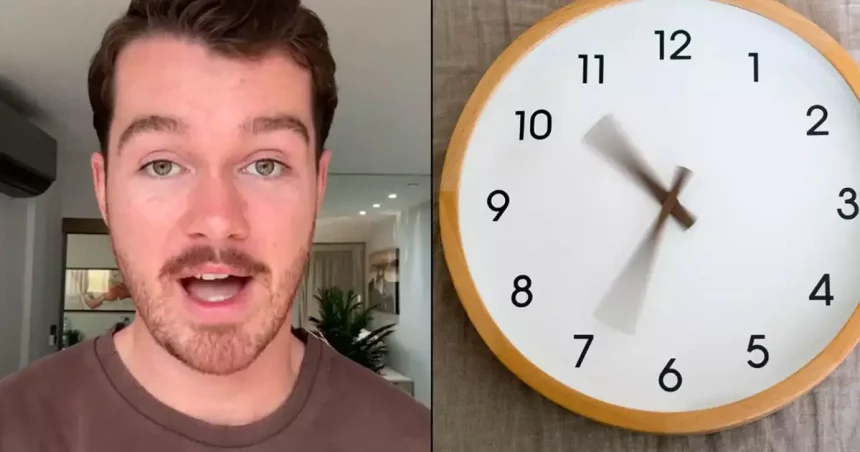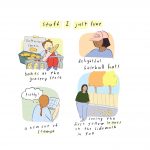Have you ever wondered why time seems to fly by faster than ever, especially since 2020?
You’re not alone. Many people feel like the days are long, but the years are short. In a TikTok video, Thomas Mulligan shared a theory called the “time perception theory,” which suggests that our changing perception of time is to blame. Let’s explore his idea and other psychological insights on why time feels like it’s speeding up.
The Time Perception Theory Explained
Thomas Mulligan’s theory about why time feels like it’s speeding up touches on a psychological principle: as we age, each year represents a smaller fraction of our life. When you’re a child, a year feels like an eternity because it makes up a significant portion of your life. By the time you’re 30, one year only accounts for a tiny slice of your existence, which makes it feel shorter. Mulligan explains: “On your first birthday, one year makes up 100 percent of your life. By your second, one year makes up 50 percent of your life. By the time you turn 20, one year makes up five percent of your life”. This shrinking proportion, he suggests, leads to the sensation that time is moving faster as we grow older.
How Familiarity Affects Time Perception
Psychologists have long noted that our experience of time is influenced by how much new information our brains process. When we encounter new and unfamiliar experiences, time seems to slow down because our minds are busy absorbing and analyzing all the details. In contrast, routine and familiarity cause our perception of time to speed up, as there’s less for our brain to process. According to neuroscientist Santosh Kesari, when we’re children, we’re constantly exposed to new experiences that leave lasting impressions. “We gauge time by memorable events, and fewer new things occur as we age to remember, making it seem like childhood lasted longer,” Kesari explains. This aligns with Mulligan’s observation that our perception of time shifts significantly as we grow older.
The Impact of 2020 and the Digital Shift
Many people believe that the events of 2020 played a huge role in distorting our perception of time. The pandemic and lockdowns forced many into a repetitive cycle of remote work and limited social interactions, creating a blur of days that all seemed the same. This sense of being out of touch with the physical world and more immersed in a digital environment contributed to the feeling that the past few years have flown by. The concept of a “lockdown age” suggests that while the world outside was on pause, our perception of time became skewed. Mulligan’s theory touches on how our immersion in digital spaces, where every day feels much like the last, accelerates the sensation of time passing quickly.
The Role of Novel Experiences
One way to combat the feeling that time is slipping away is to engage in new experiences. Psychologists suggest that introducing novelty into our lives can help slow down our perception of time. When we travel to new places, learn new skills, or try different activities, our brains are more engaged and time feels more expansive. Costello highlights the idea of the “Holiday Paradox,” where enjoyable experiences seem to fly by in the moment but feel longer in retrospect due to the number of unique memories they create. To stretch out our experience of time, it’s important to keep seeking out new and interesting activities.
Mindfulness and Being Present
Another technique to slow down your perception of time is mindfulness. By focusing on the present moment, you can make your everyday experiences feel richer and more significant. Whether it’s feeling the warmth of the water in the shower or paying attention to the scenery on your commute, being mindful can make these moments stand out in your memory. “Living through our senses and experiences, rather than our thoughts, has a time-expanding effect,” explains Costello. This shift in focus can help you savor each moment, making time feel fuller and less fleeting.
Why Time Flies Faster as We Age
The idea that time speeds up as we age is a widely accepted psychological phenomenon. The relativity of time perception means that as we grow older, each year feels shorter because it constitutes a smaller fraction of our life. The lack of new experiences and the familiarity of routine only serve to amplify this sensation. Neuroscientist Patricia Costello points out that children’s brains are still developing, which affects their perception of time. “Children’s working memory, attention, and executive function are all undergoing development, which in turn affects how they perceive the passage of time,” she explains. This difference in neural processing may explain why childhood seems to stretch on forever compared to adulthood.
Making Time Slow Down: Practical Tips
To make time feel like it’s passing more slowly, try to break free from routine and engage in new activities whenever possible. Traveling to unfamiliar places, picking up new hobbies, or even meeting new people can make your experiences more vivid and memorable. The goal is to increase the amount of information your brain processes, thereby expanding your sense of time. Kesari also suggests reflecting on your day in detail as a way to enrich your memory. “Spend half an hour every night really reflecting on what has happened that day. It may ingrain them to make them more unique,” he advises. This practice helps anchor your memories, making time feel longer and more significant.






